一般将来时专项练习二
专项训练一般将来时练习题(含答案)
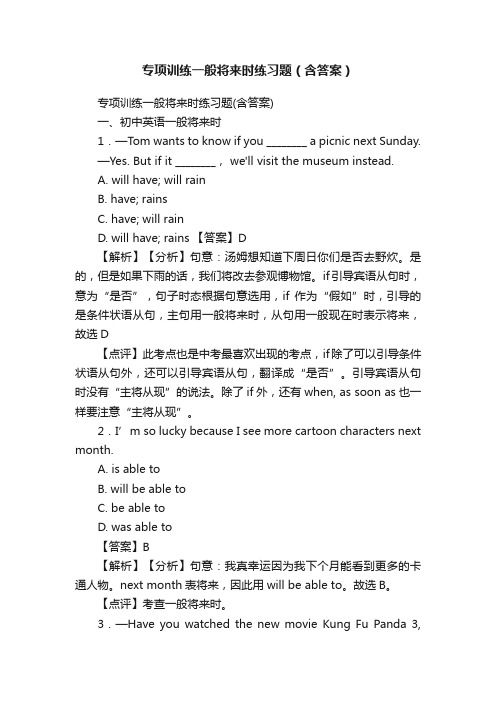
专项训练一般将来时练习题(含答案)专项训练一般将来时练习题(含答案)一、初中英语一般将来时1.—Tom wants to know if you ________ a picnic next Sunday.—Yes. But if it ________, we'll visit the museum instead.A. will have; will rainB. have; rainsC. have; will rainD. will have; rains 【答案】D【解析】【分析】句意:汤姆想知道下周日你们是否去野炊。
是的,但是如果下雨的话,我们将改去参观博物馆。
if引导宾语从句时,意为“是否”,句子时态根据句意选用,if 作为“假如”时,引导的是条件状语从句,主句用一般将来时,从句用一般现在时表示将来,故选D【点评】此考点也是中考最喜欢出现的考点,if除了可以引导条件状语从句外,还可以引导宾语从句,翻译成“是否”。
引导宾语从句时没有“主将从现”的说法。
除了if外,还有when, as soon as也一样要注意“主将从现”。
2.I’m so lucky because I see more cartoon characters next month.A. is able toB. will be able toC. be able toD. was able to【答案】B【解析】【分析】句意:我真幸运因为我下个月能看到更多的卡通人物。
next month表将来,因此用will be able to。
故选B。
【点评】考查一般将来时。
3.—Have you watched the new movie Kung Fu Panda 3,Kelly?—Not yet. I _____ it with my classmate tonight.A. will watchB. was watchingC. have watched【答案】A【解析】【分析】句意:—凯莉,你看过新电影《功夫熊猫3》吗?—还没有呢。
一般将来时练习题及答案
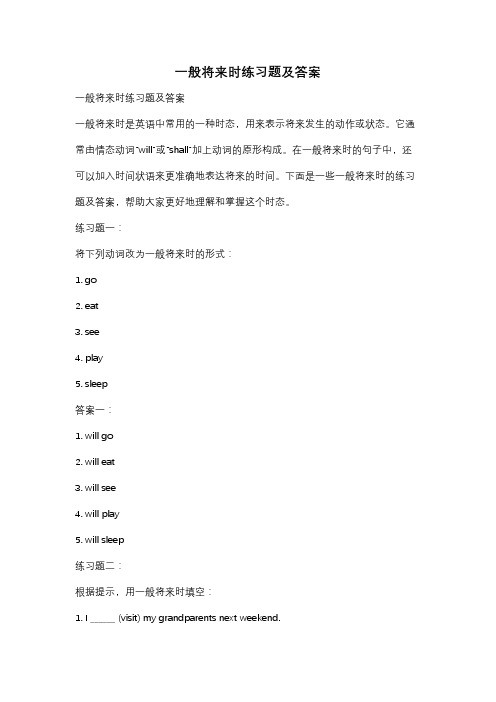
一般将来时练习题及答案一般将来时练习题及答案一般将来时是英语中常用的一种时态,用来表示将来发生的动作或状态。
它通常由情态动词“will”或“shall”加上动词的原形构成。
在一般将来时的句子中,还可以加入时间状语来更准确地表达将来的时间。
下面是一些一般将来时的练习题及答案,帮助大家更好地理解和掌握这个时态。
练习题一:将下列动词改为一般将来时的形式:1. go2. eat3. see4. play5. sleep答案一:1. will go2. will eat3. will see4. will play5. will sleep练习题二:根据提示,用一般将来时填空:1. I ______ (visit) my grandparents next weekend.2. They ______ (have) a party next month.3. She ______ (buy) a new car next year.4. We ______ (travel) to Europe next summer.5. He ______ (start) his new job next week.答案二:1. will visit2. will have3. will buy4. will travel5. will start练习题三:选择正确的一般将来时形式填空:1. I ______ (will / am going to) study for the exam tomorrow.2. They ______ (will / are going to) visit their friends in the evening.3. She ______ (will / is going to) cook dinner for her family tonight.4. We ______ (will / are going to) go shopping this weekend.5. He ______ (will / is going to) meet his friends at the park later. 答案三:1. will2. are going to3. is going to4. are going to5. is going to练习题四:根据句意,用一般将来时填空:1. The train ______ (arrive) at 10 o'clock tomorrow morning.2. We ______ (have) a picnic if the weather is nice.3. She ______ (not go) to the party because she has other plans.4. They ______ (not watch) the movie because they have already seen it.5. He ______ (not come) to the meeting because he is busy.答案四:1. will arrive2. will have3. will not go4. will not watch5. will not come练习题五:将下列句子改为否定句和疑问句形式:1. I will finish my homework.2. They will go to the beach.3. She will buy a new dress.4. We will have dinner at the restaurant.5. He will meet his friends at the cinema.答案五:1. I will not finish my homework. / Will I not finish my homework?2. They will not go to the beach. / Will they not go to the beach?3. She will not buy a new dress. / Will she not buy a new dress?4. We will not have dinner at the restaurant. / Will we not have dinner at the restaurant?5. He will not meet his friends at the cinema. / Will he not meet his friends at the cinema?通过以上的练习题及答案,希望大家对一般将来时有了更深入的了解。
一般将来时的用法练习答案解析(二)
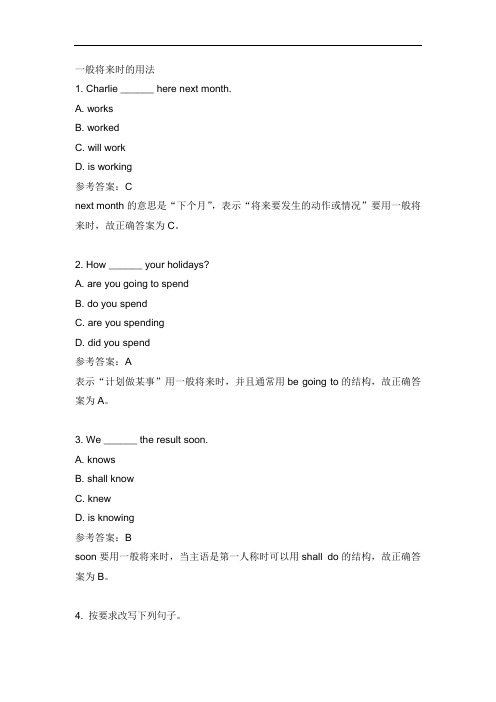
一般将来时的用法1. Charlie ______ here next month.A. worksB. workedC. will workD. is working参考答案:Cnext month的意思是“下个月”,表示“将来要发生的动作或情况”要用一般将来时,故正确答案为C。
2. How ______ your holidays?A. are you going to spendB. do you spendC. are you spendingD. did you spend参考答案:A表示“计划做某事”用一般将来时,并且通常用be going to的结构,故正确答案为A。
3. We ______ the result soon.A. knowsB. shall knowC. knewD. is knowing参考答案:Bsoon要用一般将来时,当主语是第一人称时可以用shall do的结构,故正确答案为B。
4. 按要求改写下列句子。
- Shall I come again tomorrow afternoon?(作肯定回答)- ______ .参考答案:Yes,please在一般将来时中,当主语是第一人称时,常用shall,当shall用于第一人称征求对方的意见时,做肯定回答时应该用yes,please,故正确答案为Yes,please。
5. - Shall I buy a cup of tea for you?- ______ .(不,不要。
)A. No, you won’tB. No, you aren’tC. No, please don’tD. No, please参考答案:C当shall用于第一人称征求对方的意见时,做否定回答时应该用No,please don’t,故正确答案为C。
6. Don't worry about the exam. I'm sure you ______ .A. passB. will passC. passedD. is passing参考答案:B“I expect,I’m sure,I think,I wonder”等的宾语从句通常用一般将来时,故正确答案为B。
(牛津版初中时态语态练习)一般现在时一般过去时一般将来时现在进行时混合练习2(附答案)

一、根据要求改写下列句子。
一、根据要求改写下列句子。
1.This is my pencil. (变为一般疑问句) Is this your pencil? 2.She is going on a trip to Beijing now. (用I做主语改写句子) I am going on a trip to Beijing now. 3.He found some meat in the fridge. (改为一般疑问句) Did he find any meat in the fridge? 4.It is going to be a fine day tomorrow. (改为否定句) It isn’tgoing to be a fine day tomorrow. 5.I stay at home on Saturdays. (对划线部分提问) What do you do on Saturdays? 6.That bird is red. (对划线部分提问) What color is that bird? 7.They are having lunch at school at the moment. (对划线部分提问) What are they doing at school at the moment? 8.Lucy doesn't have sports every day. (变为肯定句) Lucy has sports every day. 9.She stayed there for a week. (对划线部分提问) How long did she stay there? 10.He came back just now. (用in two days改写句子) He will come back in two days. 11.He likes the black bag very much. (变为否定句) He doesn't like the black bag at all. 12.I spend only 45 yuan on the coat. (用she改写句子) She spends only 45 yuan on the coat. 13.There were some oranges in the cup. (改为一般疑问句) Were there any oranges in the cup? 14.I am going to come to the get-together tomorrow. (改为一般疑问句) Are you going to come to the get-together tomorrow? 15.The girl is si ng on the blue box. (改为一般疑问句) Is the girl si ng on the blue box? 16.She lives in a small town near Beijing. (改为一般疑问句) Does she live in a small town near Beijing? 17.--- Will the twins buy the red T-shirt? (做肯定回答) --- Yes, they will. 18.is, what, the girl, over there, in red, doing (?) (连词成句) What is the girl in red doing over there? 19.Amy took some photos at the zoo last Saturday. (改为否定句) Amy didn't take any photos at the zoo last Saturday. 20.We have a music class on Thursday. (用right now改写句子) We are having a music class right now. 21.Mr. Brown will visit the Great Wall next summer. (对划线部分提问) What will Mr. Brown do next summer? 22.Do you o en take exercise? (用now改写句子) Are you taking exercise now? 23.Lucy did her homework at home. (改为否定句) Lucy didn't do her homework at home. 25.I’m going to listen to music next Sunday. (对话向部分提问) What are you going to do next Sunday? 26.I arrived just a few minutes ago. (对划线部分提问) When did you arrive? 27.He is doing his homework. (改为复数句) They are doing their homework. 28.Daniel will meet you at the airport this evening. (改为一般疑问句) Will Daniel meet you at the airport this evening? 29.We’ll be back in about an hour. (对划线部分提问) How soon will you be back? 30.Robert was a taxi-driver. (改为同义句) Robert used to be a taxi-driver. 31.Everyone in enjoying themselves. (改为同义句) Everyone is having a good me. 32.There are two libraries in that town. (用next year改写句子) There will be two libraries in that town next year. 33.Tony is going to play football with us. (对划线部分提问) Who is going to play footballwith us? 34.It'san English-Chinese dic onary. (对划线部分提问) What is it? 二、单项选择。
一般将来时专项练习(含答案)
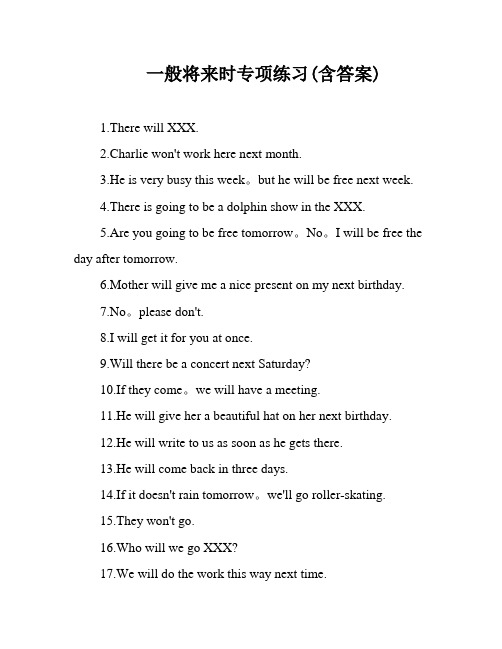
一般将来时专项练习(含答案)1.There will XXX.2.Charlie won't work here next month.3.He is very busy this week。
but he will be free next week.4.There is going to be a dolphin show in the XXX.5.Are you going to be free tomorrow。
No。
I will be free the day after tomorrow.6.Mother will give me a nice present on my next birthday.7.No。
please don't.8.I will get it for you at once.9.Will there be a concert next Saturday?10.If they come。
we will have a meeting.11.He will give her a beautiful hat on her next birthday.12.He will write to us as soon as he gets there.13.He will come back in three days.14.If it doesn't rain tomorrow。
we'll go roller-skating.15.They won't go.16.Who will we go XXX?17.We will do the work this way next time.18.Tomorrow。
he plans to fly a kite in the open air first and then go boating in the park。
(word完整版)初中英语一般将来时专项练习题(2)

、单项选择( )1. There a meeting tomorrow afternoon.A. will be going toB. will going to beC. is going to beD. will go to be( )2. Charlie here next month.A. isn ' t workingB. doesn ' t workinC. isn ' t going to workingD. won ' t work( )3. He very busy this week, he free next week.A. will be; isB. is; isC. will be; will beD. is; will be( )4. There a dolphin show in the zoo tomorrow evening.A. wasB. is going to haveC. will haveD. is going to be( )5. -you free tomorrow? — No. I free the day after tomorrow.A. Are; going to; willB. Are; going to be; willC. Are; going to; will beD. Are; going to be; will be( )6. Mother me a nice present on my next birthday.A. will givesB. will giveC. givesD. give()7. - Shall I buy a cup of tea for you? -.(不,不要。
)A. No, you won' t.B. No, you aren 'Ct . No, please don ' D.. No, please.( )8. - Where is the morning paper? T if for you at once.A. getB. am gettingC. to getD. will get( )9. a concert next Saturday?A. There will beB. Will there beC. There can beD. There are ( )10. If they come, we a meeting.A. haveB. will haveC. hadD. would have ( )11. He her a beautiful hat on her next birthday.A. givesB. gaveC. will givingD. is going to giving ( )12. He to us as soon as he gets there.A. writesB. has writtenC. will writeD. wrote ()13. He in three days.A. coming backB. came back )14. If it tomorrow, we A. isn ' t rain B. won ' t rainC. doesn 't rain D. doesn ' t fine ( )15. — Will his parents go to see the Terra Cotta Warriors tomorrow?-No, (不去).A. they willn 'B. they won ' t.C. they aren ' tD. they don ' t.( )16. Who we swimming with tomorrow afternoon?A. will; goB. do; goC. will; goingD. shall; go( )17. We the work this way next time.A. doB. will doC. going to doD. will doing( )18. Tomorrow he a kite in the open air first, and then boating in the park.A. will fly; will goB. will fly; goesC. is going to fly; will goesD. flies; will go( )19. The day after tomorrow they a volleyball match.A. will watchingB. watchesC. is watchingD. is going to watch ( )20. There a birthday party thisSunday.A. shall beB. will beC. shall going to beD. will going to be( )21. They an English evening next Sunday.A. are havingB. are going to haveC. will havingD. is going to have( )22.you free next Sunday?A. Will; areB. Will; beC. Do; beD. Are; be( )23. He there at ten tomorrow morning.A. willB. isC. will beD. be( )24.your brother a magazine from the library? A. Are; going to borrow B. Is; going to borrowC. Will; borrowsD. Are; going to borrows ( )25. — Shall I come again tomorrow afternoon? - (好的)A. Yes, pleaseB. Yes, you will.C. No, please.D. No, you won ' t.( )26. It the year of the horse next year.A. is going to beB. is going toC. will beD. will is( )27.open the window?般将来时专项练习C. will come backD. is going to coming back "-skatonrpllerA. Will you pleaseB. Please will youC. You pleaseD. Do you ()28. -Let' s go out to play football, shall we? -OK. I.A. will comingB. be going to comeC. comeD. am coming( )29. It us a long time to learn English well.A. takesB. will takeC. spendsD. will spend()30. The train at 11.A. going to arriveB. will be arriveC. is going toD. is arriving二、动词填空。
一般将来时练习题及答案
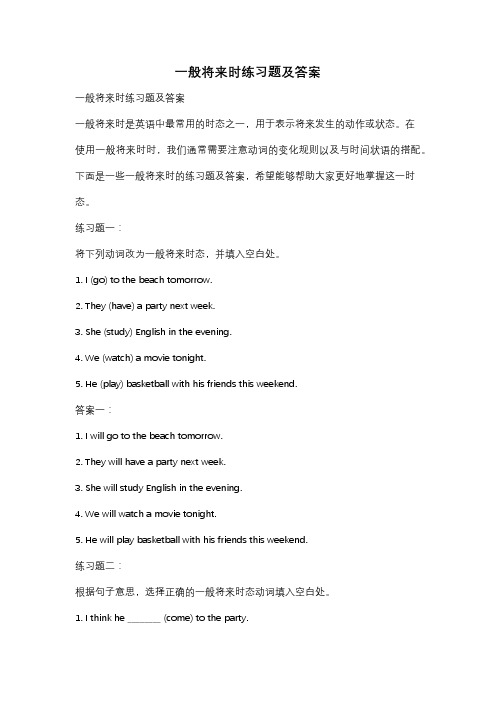
一般将来时练习题及答案一般将来时练习题及答案一般将来时是英语中最常用的时态之一,用于表示将来发生的动作或状态。
在使用一般将来时时,我们通常需要注意动词的变化规则以及与时间状语的搭配。
下面是一些一般将来时的练习题及答案,希望能够帮助大家更好地掌握这一时态。
练习题一:将下列动词改为一般将来时态,并填入空白处。
1. I (go) to the beach tomorrow.2. They (have) a party next week.3. She (study) English in the evening.4. We (watch) a movie tonight.5. He (play) basketball with his friends this weekend.答案一:1. I will go to the beach tomorrow.2. They will have a party next week.3. She will study English in the evening.4. We will watch a movie tonight.5. He will play basketball with his friends this weekend.练习题二:根据句子意思,选择正确的一般将来时态动词填入空白处。
1. I think he ________ (come) to the party.2. They ________ (not be) late for the meeting.3. We ________ (visit) our grandparents next month.4. She ________ (not go) to the concert with us.5. ________ you ________ (help) me with my homework?答案二:1. I think he will come to the party.2. They will not be late for the meeting.3. We will visit our grandparents next month.4. She will not go to the concert with us.5. Will you help me with my homework?练习题三:根据句子意思,用一般将来时态的动词填空。
一般现在时一般过去时一般将来时现在进行时混合练习2附答案
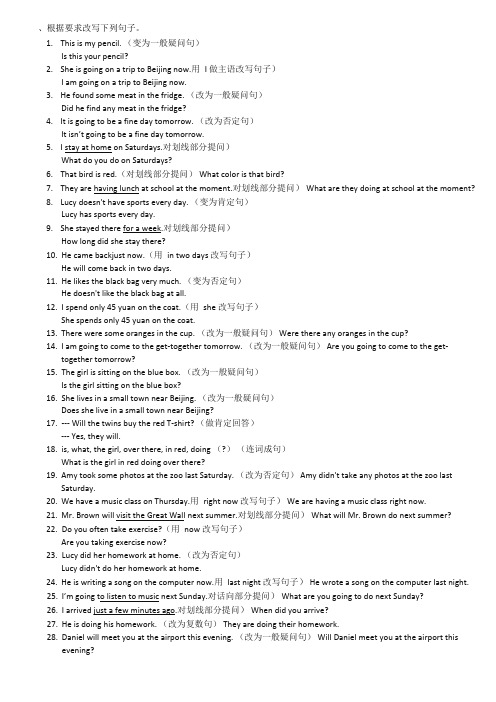
、根据要求改写下列句子。
1.This is my pencil. (变为一般疑问句)Is this your pencil?2.She is going on a trip to Beijing now.用I 做主语改写句子)I am going on a trip to Beijing now.3.He found some meat in the fridge. (改为一般疑问句)Did he find any meat in the fridge?4.It is going to be a fine day tomorrow. (改为否定句)It isn’t going to be a fine day tomorrow.5.I stay at home on Saturdays.对划线部分提问)What do you do on Saturdays?6.That bird is red.(对划线部分提问) What color is that bird?7.They are having lunch at school at the moment.对划线部分提问) What are they doing at school at the moment?8.Lucy doesn't have sports every day. (变为肯定句)Lucy has sports every day.9.She stayed there for a week.对划线部分提问)How long did she stay there?10.He came backjust now.(用in two days 改写句子)He will come back in two days.11.He likes the black bag very much. (变为否定句)He doesn't like the black bag at all.12.I spend only 45 yuan on the coat.(用she 改写句子)She spends only 45 yuan on the coat.13.There were some oranges in the cup. (改为一般疑问句) Were there any oranges in the cup?14.I am going to come to the get-together tomorrow. (改为一般疑问句) Are you going to come to the get-together tomorrow?15.The girl is sitting on the blue box. (改为一般疑问句)Is the girl sitting on the blue box?16.She lives in a small town near Beijing. (改为一般疑问句)Does she live in a small town near Beijing?17.--- Will the twins buy the red T-shirt? (做肯定回答)--- Yes, they will.18.is, what, the girl, over there, in red, doing (?)(连词成句)What is the girl in red doing over there?19.Amy took some photos at the zoo last Saturday. (改为否定句) Amy didn't take any photos at the zoo lastSaturday.20.We have a music class on Thursday.用right now 改写句子) We are having a music class right now.21.Mr. Brown will visit the Great Wall next summer.对划线部分提问) What will Mr. Brown do next summer?22.Do you often take exercise?(用now 改写句子)Are you taking exercise now?23.Lucy did her homework at home. (改为否定句)Lucy didn't do her homework at home.24.He is writing a song on the computer now.用last night 改写句子) He wrote a song on the computer last night.25.I’m going t o listen to music next Sunday.对话向部分提问) What are you going to do next Sunday?26.I arrived just a few minutes ago.对划线部分提问) When did you arrive?27.He is doing his homework. (改为复数句) They are doing their homework.28.Daniel will meet you at the airport this evening. (改为一般疑问句) Will Daniel meet you at the airport thisevening?29.We’ll be bac k in about an hour.对划线部分提问) How soon will you be back?30.Robert was a taxi-driver. (改为同义句) Robert used to be a taxi-driver.31.Everyone in enjoying themselves. (改为同义句) Everyone is having a good time.32.There are two libraries in that town. (用next year 改写句子) There will be two libraries in that town next year.33.Tony is going to play football with us.对划线部分提问) Who is going to play football with us?34.It's an English-Chinese dictionary.(对划线部分提问) What is it?二、单项选择。
一般将来时练习题及答案
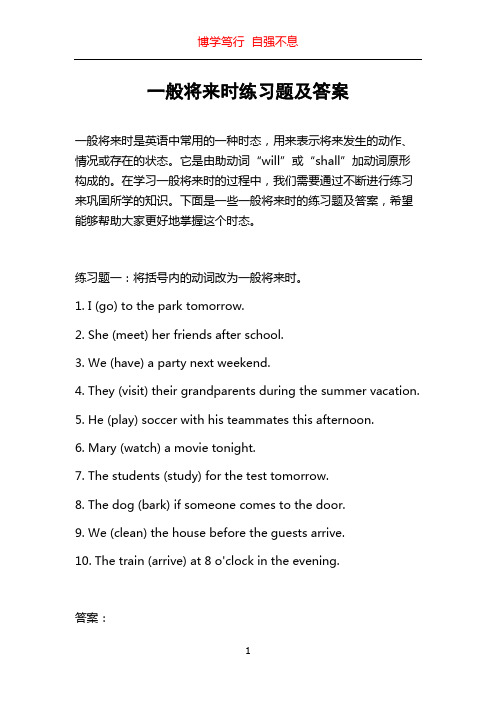
一般将来时练习题及答案一般将来时是英语中常用的一种时态,用来表示将来发生的动作、情况或存在的状态。
它是由助动词“will”或“shall”加动词原形构成的。
在学习一般将来时的过程中,我们需要通过不断进行练习来巩固所学的知识。
下面是一些一般将来时的练习题及答案,希望能够帮助大家更好地掌握这个时态。
练习题一:将括号内的动词改为一般将来时。
1. I (go) to the park tomorrow.2. She (meet) her friends after school.3. We (have) a party next weekend.4. They (visit) their grandparents during the summer vacation.5. He (play) soccer with his teammates this afternoon.6. Mary (watch) a movie tonight.7. The students (study) for the test tomorrow.8. The dog (bark) if someone comes to the door.9. We (clean) the house before the guests arrive.10. The train (arrive) at 8 o'clock in the evening.答案:1. will go2. will meet3. will have4. will visit5. will play6. will watch7. will study8. will bark9. will clean10. will arrive练习题二:根据提示完成下列对话,使用一般将来时。
A: Hi, Lisa! What (you/do) this weekend?B: I (visit) my grandparents. They live in the countryside. A: That sounds nice. How long (you/stay) there?B: I (stay) for two days. I'll come back on Sunday evening. A: Have a great time!答案:A: Hi, Lisa! What will you do this weekend?B: I will visit my grandparents. They live in the countryside. A: That sounds nice. How long will you stay there?B: I will stay for two days. I'll come back on Sunday evening. A: Have a great time!练习题三:选择正确的动词形式填空。
一般将来时练习2
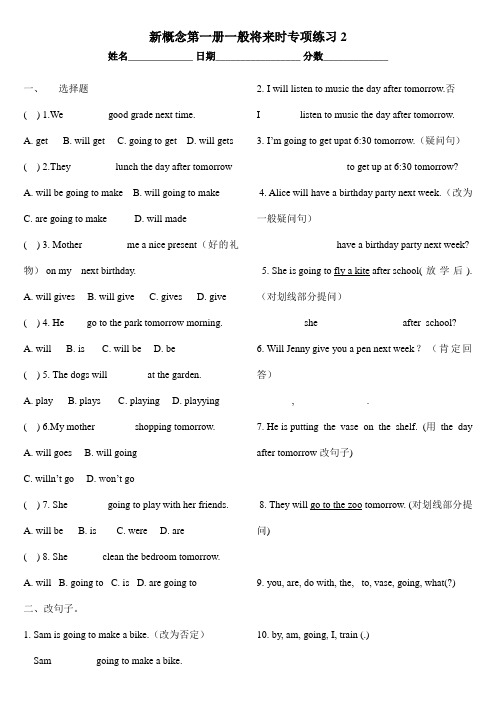
新概念第一册一般将来时专项练习2姓名_____________ 日期_________________ 分数_____________一、选择题( ) 1.We ________ good grade next time.A. getB. will getC. going to getD. will gets ( ) 2.They ________ lunch the day after tomorrow A. will be going to make B. will going to make C. are going to make D. will made( ) 3. Mother ________ me a nice present(好的礼物) on my next birthday.A. will givesB. will giveC. givesD. give ( ) 4. He____ go to the park tomorrow morning.A. willB. isC. will beD. be( ) 5. The dogs will _______ at the garden.A. playB. playsC. playingD. playying ( ) 6.My mother _______ shopping tomorrow. A. will goes B. will goingC. willn’t goD. won’t go( ) 7. She _______ going to play with her friends.A. will beB. isC. wereD. are( ) 8. She ______ clean the bedroom tomorrow.A. willB. going toC. isD. are going to二、改句子。
1. Sam is going to make a bike.(改为否定)Sam ________ going to make a bike. 2. I will listen to music the day after tomorrow.否I _______ listen to music the day after tomorrow.3. I’m going to get upat 6:30 tomorrow.(疑问句) ____ ____ ________ to get up at 6:30 tomorrow?4. Alice will have a birthday party next week.(改为一般疑问句)_______ ________ have a birthday party next week?5. She is going to fly a kite after school(放学后).(对划线部分提问)_____ ___ she ______ _____ ____ after school? 6. Will Jenny give you a pen next week?(肯定回答)_______,_______ _______.7. He is putting the vase on the shelf. (用the day after tomorrow改句子)___________________________________________ 8. They will go to the zoo tomorrow. (对划线部分提问)___________________________________________ 9. you, are, do with, the, to, vase, going, what(?)__________________________________________ 10. by, am, going, I, train (.)_________________________________________。
小学英语语法专项练习-一般将来时2be going to
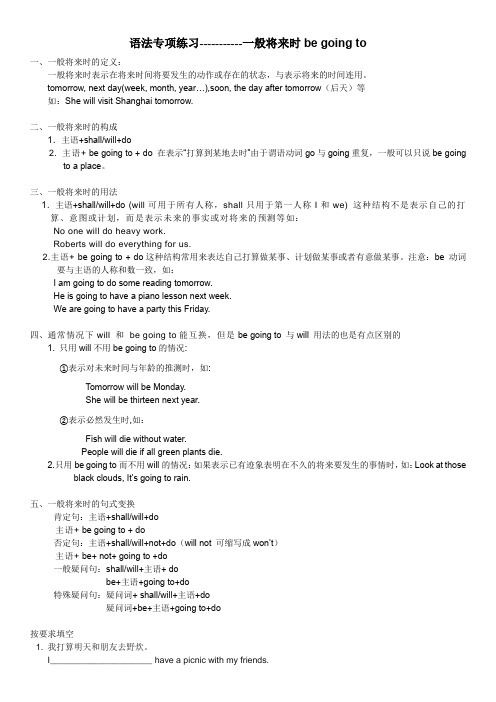
语法专项练习-----------一般将来时be going to一、一般将来时的定义:一般将来时表示在将来时间将要发生的动作或存在的状态,与表示将来的时间连用。
tomorrow, next day(week, month, year…),soon, the day after tomorrow(后天)等如:She will visit Shanghai tomorrow.二、一般将来时的构成1.主语+shall/will+do2. 主语+ be going to + do 在表示“打算到某地去时”由于谓语动词go与going重复,一般可以只说be goingto a place。
三、一般将来时的用法1.主语+shall/will+do (will可用于所有人称,shall只用于第一人称I和we) 这种结构不是表示自己的打算、意图或计划,而是表示未来的事实或对将来的预测等如:No one will do heavy work.Roberts will do everything for us.2.主语+ be going to + do这种结构常用来表达自己打算做某事、计划做某事或者有意做某事。
注意:be 动词要与主语的人称和数一致,如:I am going to do some reading tomorrow.He is going to have a piano lesson next week.We are going to have a party this Friday.四、通常情况下will 和be going to能互换,但是be going to 与will 用法的也是有点区别的1. 只用will不用be going to的情况:①表示对未来时间与年龄的推测时,如:Tomorrow will be Monday.She will be thirteen next year.②表示必然发生时,如:Fish will die without water.People will die if all green plants die.2.只用be going to而不用will的情况:如果表示已有迹象表明在不久的将来要发生的事情时,如:Look at thoseblack clouds, It’s going to rain.五、一般将来时的句式变换肯定句:主语+shall/will+do主语+ be going to + do否定句:主语+shall/will+not+do(will not 可缩写成won’t)主语+ be+ not+ going to +do一般疑问句:shall/will+主语+ dobe+主语+going to+do特殊疑问句:疑问词+ shall/will+主语+do疑问词+be+主语+going to+do按要求填空1. 我打算明天和朋友去野炊。
一般将来时练习题及答案
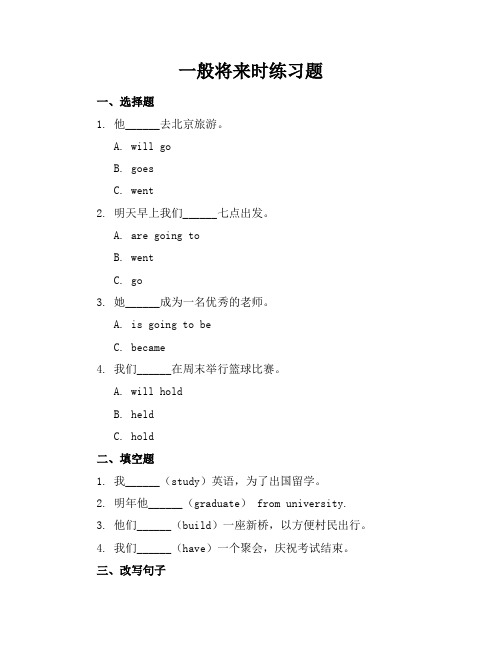
一般将来时练习题一、选择题1. 他______去北京旅游。
A. will goB. goesC. went2. 明天早上我们______七点出发。
A. are going toB. wentC. go3. 她______成为一名优秀的老师。
A. is going to beC. became4. 我们______在周末举行篮球比赛。
A. will holdB. heldC. hold二、填空题1. 我______(study)英语,为了出国留学。
2. 明年他______(graduate) from university.3. 他们______(build)一座新桥,以方便村民出行。
4. 我们______(have)一个聚会,庆祝考试结束。
三、改写句子1. They will visit the Great Wall next week.改写为:They are going to ______ ______ ______ next week.2. She will be a doctor in the future.改写为:She ______ ______ ______ a doctor in the future.3. We will celebrate the New Year with our family.改写为:We ______ ______ ______ the New Year with our family.四、翻译句子1. 明天我们会去动物园看熊猫。
_____________________________2. 他计划在下个月开始减肥。
_____________________________3. 他们打算在春天种植更多的树木。
_____________________________4. 我将来要成为一名科学家。
_____________________________五、情景对话A: 你长大后想做什么?B: 我______(be)一名画家。
一般将来时专项练习(含答案)

一般将来时专项练习一、单项选择。
( ) 1. There __________ a meeting tomorrow afternoon.A. will be going toB. will going to beC. is going to beD. will go to be( ) 2. Charlie ________ here next month.A. is n’t workingB. doesn’t workingC. isn’t going to workingD. won’t work( ) 3. He ________ very busy this week, he ________ free next week.A. will be; isB. is; isC. will be; will beD. is; will be( ) 4. There ________ a dolphin show in the zoo tomorrow evening.A. wasB. is going to haveC. will haveD. is going to be( ) 5. –________ you ________ free tomorrow?– No. I ________ free the day after tomorrow.A. Are; going to; willB. Are; going to be; willC. Are; going to; will beD. Are; going to be; will be ( ) 6. Mother ________ me a nice present on my next birthday.A. will givesB. will giveC. givesD. give( ) 7. – Shall I buy a cup of tea for you?–________. 〔不,不要。
一般将来时练习题及答案 (2)

一般将来时练习题及答案一般将来时是英语中的一种时态,用来表示将来的动作、事件或状态。
在使用一般将来时时,我们通常使用助动词“will”加上动词原形来构成。
以下是一些练习题及答案,帮助你巩固一般将来时的用法。
一、基础练习1.请用适当的动词形式填空:–I __________ (finish) my homework later.–She __________ (not come) to the party tomorrow.–We __________ (visit) our grandparents next week.–They __________ (not go) to the beach this summer.答案: - will finish - will not come - will visit - will not go2.请改写下列句子,使用一般将来时:–She is going to buy a new car next month.–They are not going to travel to Japan next year.–I am going to visit my friend this weekend.答案: - She will buy a new car next month. - They will not travel to Japan next year. - I will visit my friend this weekend.二、交际练习1.请根据下列对话,填写合适的一般将来时形式:–A: What are you doing this weekend?–B: I __________ (go) to the cinema with my friends.答案: - B: I will go to the cinema with my friends.2.请根据下列对话,改写句子,使用一般将来时:–A: Are you going to finish the report by tomorrow?–B: No, I will not finish the report by tomorrow.答案: - A: Will you finish the report by tomorrow? - B: No, I will not finish the report by tomorrow.三、阅读理解请阅读下面的短文,并回答问题:John and Lisa are planning a trip to France for their summer vacation. They__________ (fly) to Paris next week and will spend two weeks there. They __________ (visit) famous landmarks such as the Eiffel Tower and the Louvre Museum. They are also going to try traditional French cuisine and __________ (participate) in a cooking class. After their time in Paris, they __________ (travel) to other cities like Marseille and Nice. They __________ (return) home at the end of the month.1.John and Lisa are going to fly to Paris next week.2.They are going to spend two weeks in Paris.3.They are going to visit famous landmarks in Paris.4.John and Lisa are not going to try traditional French cuisine.5.They are going to participate in a cooking class.答案: 1. True 2. True 3. True 4. False 5. True四、写作练习请根据以下提示,写一篇关于你将来计划的文章,并使用一般将来时:•Where do you want to travel?•When do you want to go?•What do you want to do or see there?•Who do you want to go with?示例:I want to travel to Japan next year. I will go during the spring because I want to see the cherry blossoms. I want to visit famous cities like Tokyo and Kyoto and try traditional Japanese food. I also want to visit historic temples and take part in a tea ceremony. I want to go with my family because it will be a great experience to share together.五、总结一般将来时是英语中表示将来的一种时态,使用助动词“will”加上动词原形构成。
一般将来时练习题及答案学习 (2)

一般将来时用法:一般将来时表示将来某一时刻的动作或状态,其表达形式除了“s h a l l(第一人称),w i l l(第二、三人称)+动词原形构成”外,还有以下几种形式。
一.“b e g o i n g t o+动词原形”表示即将发生的或最近打算进行的事。
例如:①I t i s g o i n g t o r a i n.要下雨了。
②W e a r e g o i n g t o h a v e a m e e t i n g t o d a y.今天我们开会。
二.g o,c o m e,s t a r t,m o v e,s a i l,l e a v e,a r r i v e,s t a y,l i v e,f l y,等可用进行时态表示按计划即将发生的动作,例如:3.S h a l l w e g o t h e r e a t f i v e?我们五点钟去那儿,好吗?4.W i l l y o u p l e a s e o p e n t h e d o o r?请你把门打开,好吗?二、用b e g o i n g t o结构表示。
“b e g o i n g t o+动词原形”用来表示近期或事先考虑过的将要发生的动作以及已有迹象表明必将发生某事,意为“打算;就要”。
如:1.W e'r e g o i n g t o m e e t o u t s i d e t h e s c h o o l g a t e.我们打算在校门口见面。
2.L o o k!I t's g o i n g t o r a i n.瞧!快下雨了。
三、用现在进行时表示。
表示位置转移的动词(如:g o,c o m e,l e a v e,s t a r t,a r r i v e 等),可用现在进行时表示将来时。
如:1.U n c l e W a n g i s c o m i n g.王叔叔就要来了。
初中一般将来时练习题及答案

初中一般将来时练习题及答案一、动词的一般将来时形式:情态动词will/shall + 动词原形1. I (watch) a movie tonight.2. They (visit) their grandparents tomorrow.3. She (do) her homework after dinner.4. We (go) hiking this weekend.5. He (play) basketball with his friends next Sunday.6. The dog (bark) when it sees strangers.7. The students (have) a test next Monday.8. My parents (travel) to Japan next month.9. We (meet) at the park at 5 o'clock.10. Sarah (read) a book in the library this evening.答案:1. will watch2. will visit3. will do4. will go5. will play6. will bark7. will have8. will travel9. will meet10. will read二、用所给的动词的适当形式填空(有些已经给出)1. Lucy ______ (not play) computer games after school.2. The students ______ (not have) a holiday next week.3. Sam ______ (not go) swimming tomorrow.4. They ______ (not bring) any food to the party.5. We ______ (not watch) TV tonight.6. ______ she ______ (visit) her grandmother on Sunday?7. ______ you ______ (do) your homework tonight?8. ______ they ______ (travel) to Beijing next month?答案:1. will not play2. will not have3. will not go4. will not bring5. will not watch6. Will; visit7. Will; do8. Will; travel三、选择填空1. We ___________ to the beach this afternoon.A. wentB. will goC. goD. are going2. He ________ exercise every morning.A. will doB. doC. doesD. did3. ________ Alice _______ a party tomorrow?A. Will; haveB. Does; haveC. Did; haveD. Will; has4. I _________ my homework after dinner.A. will finishB. finishedC. finishD. will finished5. They ________ late for school tomorrow.A. areB. wereC. will beD. do答案:1. B2. C3. A4. A5. C四、将下列句子改写成一般将来时1. I go swimming every Sunday.2. We have a test next week.3. They travel to China every summer.4. She plays the piano every day.5. He buys a new car.答案:1. I will go swimming every Sunday.2. We will have a test next week.3. They will travel to China every summer.4. She will play the piano every day.5. He will buy a new car.总结:初中的一般将来时是由情态动词will/shall + 动词原形构成的。
一般现在时,现在进行时,一般将来时综合练习题(二)
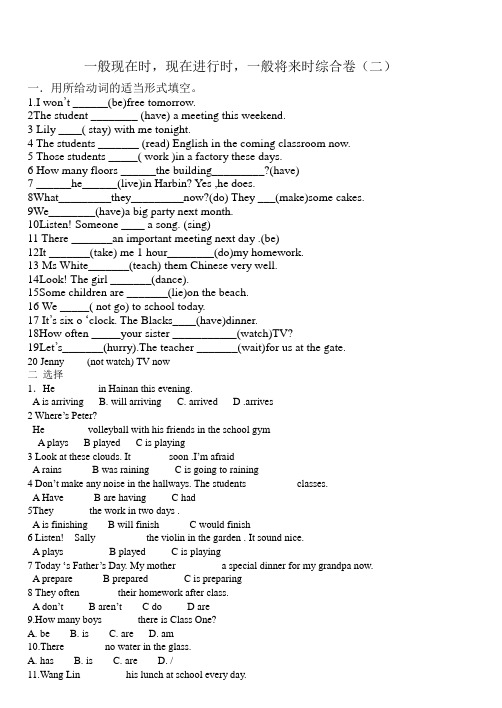
一般现在时,现在进行时,一般将来时综合卷(二)一.用所给动词的适当形式填空。
1.I won’t ______(be)free tomorrow.2The student ________ (have) a meeting this weekend.3 Lily ____( stay) with me tonight.4 The students _______ (read) English in the coming classroom now.5 Those students _____( work )in a factory these days.6 How many floors ______the building_________?(have)7 ______he______(live)in Harbin? Y es ,he does.8What_________they_________now?(do) They ___(make)some cakes.9We________(have)a big party next month.10Listen! Someone ____ a song. (sing)11 There _______an important meeting next day .(be)12It _______(take) me 1 hour________(do)my homework.13 Ms White_______(teach) them Chinese very well.14Look! The girl _______(dance).15Some children are _______(lie)on the beach.16 We _____( not go) to school today.17 It’s six o ‘clock. The Blacks____(have)dinner.18How often _____your sister ___________(watch)TV?19Let’s_______(hurry).The teacher _______(wait)for us at the gate.20 Jenny ____(not watch) TV now二选择1.He________ in Hainan this evening.A is arriving B. will arriving C. arrived D .arrives2 Where’s Peter?He________ volleyball with his friends in the school gymA playsB playedC is playing3 Look at these clouds. It_______ soon .I’m afraidA rainsB was rainingC is going to raining4 Don’t make any noise in the hallways. The students _________ classes.A HaveB are havingC had5They ______ the work in two days .A is finishingB will finishC would finish6 Listen! Sally _________ the violin in the garden . It sound nice.A playsB playedC is playing7 Today ‘s Father’s Day. My mother ________ a special dinner for my grandpa now.A prepareB preparedC is preparing8 They often _______their homework after class.A don’tB aren’tC doD are9.How many boys ______ there is Class One?A. beB. isC. areD. am10.There _______ no water in the glass.A. hasB. isC. areD. /11.Wang Lin ________ his lunch at school every day.A. hasB. haveC. is havingD. eats12.Listen! Some girls _______ songs in the classroom.A. singB. sangC. are singingD. have sung13.What ______ the climate _______ in winter here?A. does; likeB. is; likesC. is; lieD. do; likes14._______ Nancy and Jack have any hobbies?A. DoB. DoesC. HasD. Have15.—How does your sister spend the weekend?--Oh, she usually ______TV, and she is ______TV now.A. watch; watchB. watching; watchesC. watches; watchingD. watches; watches16.David _______ any classes on Sundays.A. don’t haveB. hasn’tC. doesn’t hasD. haven’t17.I don’t think that it’s true. He’s always ________ strange stories.A. tellB. tellingC. toldD. tells18.Mr.Smith ______ short stories, but he ______ a TV play these days.A. is writing, is writingB. is writing, writesC. writes, is writingD. writes, writes19.My father _______ every day.A. takes a walkB. took talkC. take a walkD. is taking a walk20.A: Are you making cakes? B:_______A: Y es, I do B. Y es, I am C. Y es, I’m D. Y es, I’m making21.He is writing a letter now, he _______free in an hour.A. will beB. willC. is goingD. would be22.The sun ______ in the east.A. is always risingB. is always raiseC. risesD. always raises23.He ______ his homework at home. He likes to finish it at school.A. doesn’tB. don’t doC. hasn’t doneD. doesn’t do24.Jane is busy now. She ______ pictures.A. drawsB. drewC. is drawingD. drawn25.Look! Lily with her sister _____ a kite on the playground.A. is flyingB. flyingC. are flyingD. fly26.—Where is Mr. Hu? –Look! He _____ on a big machine over there.A. worksB. workedC. is workingD. has worked27.Stay inside, please. It ______ hard right now.A. is rainingB. has rainedC. rainsD. was raining28.We ______ a sports meeting next month.A. will haveB. have hadC. willD. had29.Our knowledge of the universe _______ all the time.A. growB. is growingC. growsD. grew。
【英语】一般将来时练习题二(解析

【英语】一般将来时练习题二(解析一、单项选择一般将来时1.Peace is necessary to all. After all, it is the United States and China, as the two largest economies in the world, that ________ most from a peaceful and stable Asia-Pacific.A.are benefited B.will benefitC.will be benefited D.had benefited【答案】B【解析】试题分析:根据语境“美国和中国将受益于一个和平稳定的亚太地区”可知该句要用一般将来时,故选B。
考点:考查时态2.However hard he tries,the recorder .A.didn’t work B.won’t work C.isn’t working D.hasn’t worked 【答案】B【解析】试题分析:考查will用法。
句意:无论他多么努力尝试,这个录音机就不工作了。
本题中的will表示的是一种倾向性,如The door won’t open.故B正确。
考点:考查will用法点评:情态动词will有多种不同的用法,will可以表示临时决定做某事;或者表示将来时。
3.—Did you tell your parents about the result?—Oh, no, I forgot. I them now.A.will be calling B.will call C.am going to tell D.am to call【答案】B【解析】句意:A 选项是将来进行时,表示将来某个时间正在进行的动作;B、C、D均表示一般将来时。
will+v原形表示临时决定的;而be going to do和be to do是表示按计划或安排要做的事。
一般将来时专项练习二

一般将来时专项练习一、填空1. My brother ______ (go) to Shanghai next week.2。
Mary ________ (see)her grandfather tomorrow。
3。
David ________ (fly)kites in the park this weekend.4。
I_______ (make)a plan for English study in three days.5。
Who _______ (be)going to learn a new song next Tuesday?6。
_______ (be) you going to Beijing tomorrow?7。
We _______ (not be)going to have lunch at 12:00 tomorrow。
8. Where _______ you _______ (leave) for tomorrow?9。
_______ Tom _______ (have)a P。
E。
lesson next Monday?10. What _______ they _______ (watch) in the gym tomorrow?11. What _____ they _______ (do )tomorrow ?12. The boy _______ (not have ) an English lesson tomorrow 。
13。
________ you _______ ( learn )Chinese next week ?14。
I ________ (arrive )there tomorrow 。
15. Mike _________ ( not watch ) a movie tomorrow 。
二、选择填空1. She is going to ________ after school.A。
